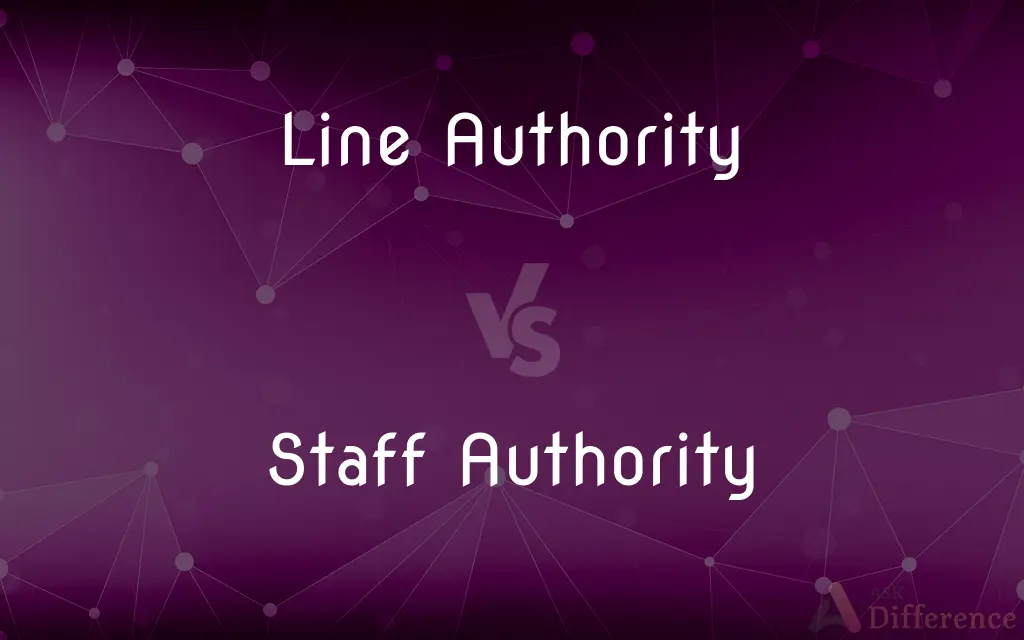Line Authority vs. Staff Authority — What's the Difference?
Edited by Tayyaba Rehman — By Fiza Rafique — Published on November 24, 2023
Line Authority refers to the direct chain of command in an organization; Staff Authority advises and supports those with line authority without direct command.

Difference Between Line Authority and Staff Authority
Table of Contents
ADVERTISEMENT
Key Differences
Line Authority represents the hierarchical structure in an organization, allowing for a clear chain of command. In contrast, Staff Authority provides specialized expertise and supports the function of line managers but doesn't possess the power to make final decisions. Both Line Authority and Staff Authority play essential roles, but their functionalities differ.
Within an organizational setup, individuals with Line Authority can issue directives and make decisions that pertain to achieving organizational goals. They have a direct impact on the organization's primary functions. Meanwhile, Staff Authority consists of specialists who offer guidance based on their expertise. While they play an advisory role, they lack the power to enforce their recommendations.
The presence of Line Authority ensures a well-defined structure, with clear responsibilities and decision-making powers. Staff Authority, on the other hand, ensures that these decisions benefit from specialized knowledge and insights. Together, both Line Authority and Staff Authority contribute to a balanced and efficient organization.
In most companies, the top management holds the Line Authority, giving them the power to control resources and organizational activities directly. In comparison, departments like human resources, research, and legal often operate with Staff Authority, assisting line managers with their expertise.
Comparison Chart
Main Function
Direct chain of command
Provide advice and support
ADVERTISEMENT
Decision-Making Power
Has decision-making power
Lacks direct decision-making power
Typical Roles
CEO, Managers, Supervisors
HR specialists, Legal advisors, Research teams
Relation to Primary Functions
Directly impacts primary functions
Supports primary functions with expertise
Nature
Hierarchical
Advisory
Compare with Definitions
Line Authority
Hierarchical power in an organizational structure.
Line Authority ensures a clear chain of command in the company.
Staff Authority
The power to advise, support, and assist line managers.
The HR director, with Staff Authority, advised on the hiring strategy.
Line Authority
The direct power to command and make decisions.
The CEO exercises Line Authority over all departments.
Staff Authority
Authority stemming from specialized knowledge or expertise.
Legal teams exercise Staff Authority when guiding on compliance matters.
Line Authority
The authority that defines superior-subordinate relationships.
Managers exercise Line Authority over their teams.
Staff Authority
A role that supports without enforcing decisions.
Research teams, having Staff Authority, suggest product improvements.
Line Authority
Power to control resources directly in an organization.
Due to his Line Authority, the department head allocated funds for the project.
Staff Authority
Expert power lacking a direct chain of command.
The IT consultant, with Staff Authority, recommended a software upgrade.
Line Authority
Authority that impacts the primary functions of an organization.
With Line Authority, the production manager can change the assembly line process.
Staff Authority
A type of authority that complements Line Authority.
Staff Authority from the finance team assisted in budgeting decisions.
Common Curiosities
Can someone possess both Line and Staff Authority?
It's rare, but some roles might encompass aspects of both, depending on the organization.
Is Line Authority more important than Staff Authority?
Both are vital; Line Authority ensures clear command, while Staff Authority offers specialized support.
What's the primary function of Line Authority?
Line Authority gives individuals the power to command and make decisions directly.
How does Staff Authority support organizations?
Staff Authority offers specialized advice and supports those with Line Authority.
Is the presence of Staff Authority a sign of bureaucracy?
Not necessarily; Staff Authority can enhance efficiency by providing expertise.
Who typically holds Line Authority in a company?
Individuals like CEOs, managers, and supervisors often have Line Authority.
Can departments like HR or Legal have Line Authority?
Typically, they operate with Staff Authority, but their influence varies by organization.
How does Line Authority impact an organization's structure?
Line Authority defines a clear hierarchical structure with distinct responsibilities.
How do employees with Staff Authority interact with other teams?
They collaborate by offering advice and support based on their expertise.
Do those with Staff Authority make final decisions?
No, they provide advice and expertise but lack direct decision-making power.
Share Your Discovery

Previous Comparison
In Future vs. In the Future
Next Comparison
Jail vs. Detention CenterAuthor Spotlight
Written by
Fiza RafiqueFiza Rafique is a skilled content writer at AskDifference.com, where she meticulously refines and enhances written pieces. Drawing from her vast editorial expertise, Fiza ensures clarity, accuracy, and precision in every article. Passionate about language, she continually seeks to elevate the quality of content for readers worldwide.
Edited by
Tayyaba RehmanTayyaba Rehman is a distinguished writer, currently serving as a primary contributor to askdifference.com. As a researcher in semantics and etymology, Tayyaba's passion for the complexity of languages and their distinctions has found a perfect home on the platform. Tayyaba delves into the intricacies of language, distinguishing between commonly confused words and phrases, thereby providing clarity for readers worldwide.
















































